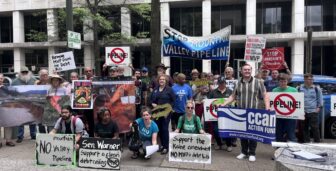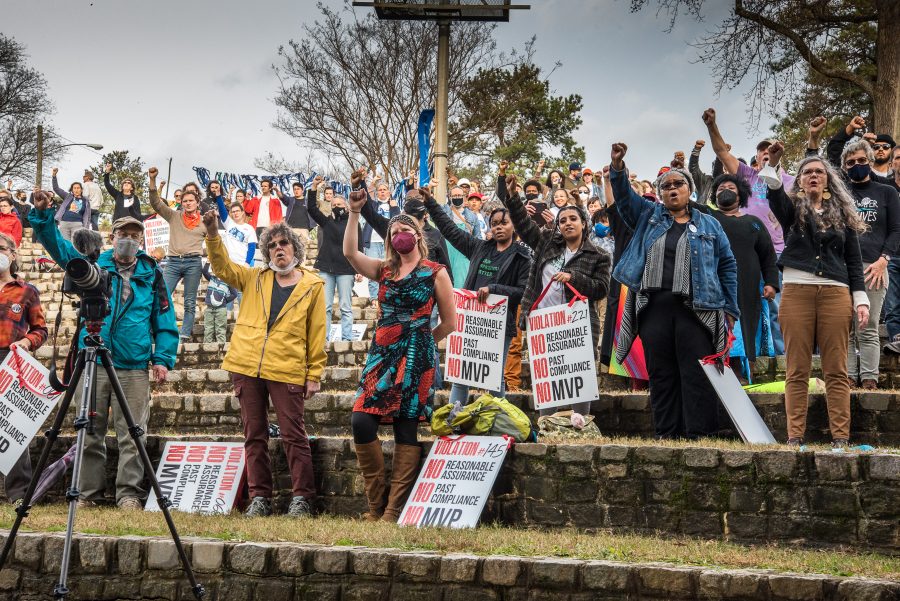A blog by Kidest, CCAN’s Virginia Communications Manager

My journey as a Virginia climate activist began as a college intern in the fight against the Atlantic Coast Pipeline, a battle we won, proving that community power can defeat even the most well-funded fossil fuel interests. That victory taught me that Virginians can defeat giant corporations that seek to pollute our communities, and I’ve found my people.
Since then, I’ve witnessed the defeat of the polluting Chickahominy gas plant and stood shoulder-to-shoulder with neighbors as we organized against the Mountain Valley Pipeline (MVP) Southgate extension. When the first permit for Southgate was denied in 2021, it felt like another victory for the people and the planet. But with new natural gas pipelines being proposed across Virginia, the pressure on our communities and environment is only increasing. The fight is far from over, we need to act now – together!
A Dangerous Pipeline, A Bad Deal Repackaged
The MVP Southgate extension is a proposed 31-mile natural gas pipeline that would snake from Pittsylvania County, Virginia, into Rockingham County, North Carolina. The developers claim it’s necessary to meet “growing public need” for natural gas, touting contracts with Duke Energy and PSNC Energy. But as someone who’s seen these justifications before, I know this is not about meeting real community needs, but about locking our region into decades of fossil fuel dependence.

Right now, the Southgate extension is undergoing a crucial permit application review, and your voice is needed! The U.S. Army Corps of Engineers has opened a 30-day public comment period, ending May 30, 2025, for MVP Southgate’s request for a Clean Water Act permit. This permit would allow the pipeline to negatively affect our streams and wetlands, which our communities depend on in both Virginia and North Carolina.
Join us in advocating against this dangerous pipeline and submit comments to the US Army Corps of Engineers in opposition to the project using the how to guide here.
The pipeline’s original plan was even more destructive, spanning 75 miles and requiring a massive compressor station in a predominantly Black community near Chatham, Virginia. In 2021, the Chatham community stood up to oppose the toxic pollutants that would have come from the then-proposed Lambert Compressor Station, leading the Virginia Air Pollution Board to reject an air permit based on environmental justice concerns. This win, however, was sadly short-lived. In 2023, MVP submitted a new project plan that doesn’t include the Lambert Compressor Station. The new plan now has a shorter route and a wider pipe, but these tweaks do not reduce the threat to our communities and our environment.
MVP’s Track record: Community Harm and Environmental Destruction
MVP’s track record is a warning. Construction of the main pipeline has already destroyed forests, seized private property, and violated water regulations hundreds of times. The MVP Southgate extension brings more concerns about the possibility of repeated environmental violations. Erosion from construction threatens groundwater and private wells, which are vital in our rural communities. Even worse, the risk of pipeline toxic leaks and explosions puts homes and lives in danger within a half-mile of the pipeline route.
These are not just hypothetical risks. MVP’s mainline has racked up over 350 water quality violations, many affecting rivers and streams that supply drinking water. The pipeline also turns communities, often Black, Indigenous, and low-income, into “sacrifice zones”, bearing the brunt of pollution and health risks from fossil fuel infrastructure.
People-Powered Organizing & Community Resistance Defeated Southgate Before

The denial of the first MVP Southgate extension air permit in 2021 was no accident, it was the result of relentless organizing by Pittsylvania residents and Virginians advocating for healthier communities. Just last month, thousands of Virginians submitted comments to our Federal Energy Regulatory Commission (FERC) opposing the project. In fact, our lawmakers have also recognized MVP’s history of violations and safety issues.
I’ve seen what’s possible when we come together, we’ve stopped pipelines before, and we can do it again! We have the opportunity to speak out and refuse to let our state become a dumping ground for fossil fuel interests. Your comments will help determine if a public hearing is needed and whether this project serves our communities and the public interest.
Join us and submit a comment to the U.S. Army Corps of Engineers, urging them to deny the Section 404 permit for the MVP Southgate extension. You can access our comment guide here.
About the author: Kidest is a communications strategist, storyteller, and environmental justice advocate who brings over six years of experience at the intersection of organizing, narrative change, and digital advocacy. She believes creative storytelling is a powerful tool for advancing grassroots movements, shifting public narratives, and influencing policy decisions.
Based in Richmond, Virginia, Kidest has worked alongside local organizations to amplify marginalized voices and advocate for policies that center the needs of Black communities and other historically excluded groups.





